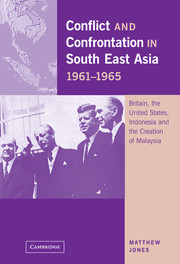 Conflict and Confrontation in South East Asia, 1961–1965
Conflict and Confrontation in South East Asia, 1961–1965 Published online by Cambridge University Press: 25 July 2009
Improving the state of relations with Jakarta occupied an important place in the foreign policy agenda of the Kennedy Administration. Indonesia's size, possession of natural resources, including oil, rubber and tin, strategic location astride lines of communication in the south west Pacific, and the fact that it was home to a significant level of US commercial investment, meant that in the late 1950s and early 1960s the state was often seen as a key prize in the Cold War competition for influence in the non-aligned world. The evident interest that the Soviet Union, under Khrushchev's energetic new leadership, exhibited during this period in cultivating ties with Jakarta, necessarily seemed to enhance Indonesia's importance to American eyes. Sukarno's visit to Moscow in September 1956 was accompanied by the extension of a $100 million long-term credit, while in early 1958 an arms deal totalling $250 million was negotiated, with Poland and Czechoslovakia acting as Soviet intermediaries. President K. I. Voroshilov's state visit to Jakarta in May 1957 had been followed up, even more significantly, by a ten-day tour of Indonesia by Khrushchev in February 1960. When put alongside other initiatives in Russian policy during this period, many American observers came to the conclusion that a Soviet economic offensive was under way in the Third World, with Indonesia one of the prime targets.
Trends within Indonesia's own complex polity did little to reassure the Americans that external Communist influence would not find a welcome audience.
To save this book to your Kindle, first ensure no-reply@cambridge.org is added to your Approved Personal Document E-mail List under your Personal Document Settings on the Manage Your Content and Devices page of your Amazon account. Then enter the ‘name’ part of your Kindle email address below. Find out more about saving to your Kindle.
Note you can select to save to either the @free.kindle.com or @kindle.com variations. ‘@free.kindle.com’ emails are free but can only be saved to your device when it is connected to wi-fi. ‘@kindle.com’ emails can be delivered even when you are not connected to wi-fi, but note that service fees apply.
Find out more about the Kindle Personal Document Service.
To save content items to your account, please confirm that you agree to abide by our usage policies. If this is the first time you use this feature, you will be asked to authorise Cambridge Core to connect with your account. Find out more about saving content to Dropbox.
To save content items to your account, please confirm that you agree to abide by our usage policies. If this is the first time you use this feature, you will be asked to authorise Cambridge Core to connect with your account. Find out more about saving content to Google Drive.